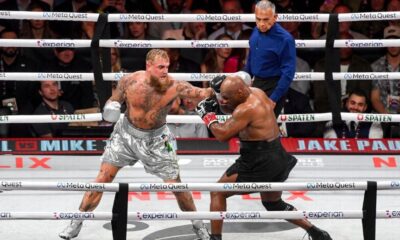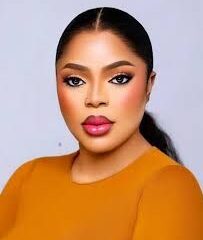Entertainment
Two Things That Promote Sex-For-Roles In Nollywood – Popular Actress Olubo Adegeye Speaks
Popular Nigerian actress, Bose Olubo shares her memories and dreams in this interview.
Nollywood actress Bose Olubo returned to the country recently after relocating to the US for many years. Although she said the relocation was necessitated by the need to be close to her children who were in school in America, she was shuttling between the two countries because she had to attend to her business in Nigeria. Olubo, who has had her hand in many pies since she returned to Nigeria, shares her memories and dreams in this interview with PAUL UKPABIO.

You seem to be more interested in business these days. What has been the inspiration?
Well, as far back as 1994, I was already having an office at Fadeyi (Lagos). I had always wanted to do business because what I fear most in this world is poverty. I have always wanted to establish something aside acting.
What kind of business did you go into?
I have been doing the same business of renting out studio equipment, cameras and light, and OBV for life streaming. That is what I have always done. To the Glory of God, I also have a factory that produces soap.
How do you cope with being a business woman and Nollywood actress?
I give Glory to God. Being an actress, like I told you, is about talent. When I am doing anything in entertainment, it is like I am living my normal life. It is not like a job to me. Though I had a brief break when I relocated abroad because of my children, I am back in the country now and I have started to go on location for recordings.
Acting and singing is very much a part of me. I go to my regular office in Ikeja. There I attend to my business. But whenever I get an acting job, I use the place to read my scripts as well. Right now, however, I do not do overnight recordings at locations except on special arrangement. It is easier for me that way.
How long were you away from Nigeria?
I was in the United States for eight years, and I enjoyed every moment of it. I was however coming to Nigeria when the children were on holidays. It was either I brought them home with me to Nigeria or they stayed with my sister while I rushed home to Nigeria. And when they resumed school, I had to go back to ensure that they were back in school and flowing with the rhythm. That is why in the last few years you have not been seeing much of my works. But I am fully back to Nigeria now.
So what led you into acting in the first place?
I used to be a popular face at Klinks studios in my younger days at Yaba College of Technology. At the beginning then, we had no office. The car was our office and we used to sit on the car bonnet at a popular street in Surulere. After school, I was always there. And, of course, there was the regular food place where the movie people meet. I was doing jingles and back-up singing then when I met Prince Jide Kosoko and Alade Aromire the same day. They wanted to shoot a movie and were preparing the sound track for the movie. That was how we met and that was the beginning of my full involvement in entertainment.
However, before then I had known a senior colleague, Paul Obazele, who I worked with for some time because of my interest in acting in English movies. I remember I came in through the English movies when I started. I took part in some television drama titled ‘Country People’ and others, but I had always also been involved with my colleagues who worked in the Yoruba movie sector of the entertainment industry. That is how I got into the movies.
How about your involvement in music?
Yeah, I have always been a musician. It was music before drama for me. I was already a musician before I became an actor. I had two musical albums before I started acting. I was a hit at Amen Awards then. Music started for me while I was in primary school with the likes of Bola Abimbola. My first album was produced by Yomi Omidiran. I sang contemporary African music. And some people still remember my music.
I am like a prophet when I sing. When the inspiration comes, I receive it and then work on it. My music is usually like a sermon. I am not in the studio right now for music but I can say that I am still into music, but just waiting for the inspiration and the right time. Music and acting are more or less the same thing to me. I write as well.
Which of your talents do you cherish the most?
That is just what I am saying; it is all about inspiration. When it comes, it is left for me to decide which of my talent platforms is best used to deliver the inspiration or express it. I would have to decide whether it will be best to deliver it by singing, acting or just writing it out.
Which of your works do you consider the greatest in the Yoruba movie sector of the industry?
All my works have different meanings to me because they all come with a purpose. My first work was ‘Omo Oko’ shot in 1992, and as at that time, I was virtually the only Yoruba lady that was producing a movie. If there were others, I’m sure we wouldn’t have been more than three. I remember when the launching of the film took place and a lady who was so overwhelmed asked in wonder if I had just shot a movie.
The late Prince Alade Aromire departed suddenly. What did he mean to you?
I miss him so much. My father has been late since 1974, so I had Alade Aromire as my father. It was when he died that I really felt it most. He was a brother, but he was also a father figure to me. Imagine when I veered into the entertainment industry, my family members were alarmed and were against it. They said I studied computer science, why go into acting and theatre? But Alade Aromire stood by me. I had to run to him. He came and spoke to my parents.
My family is of the educated class and my family sees most things from that perspective. Though they knew that I had been doing this thing from when I was a child, exhibiting the artistic flair since I was young, they still wanted me to toe the line of what I studied. And I was actually lucky in the sense that I embraced computer science at the earliest stage of its arrival in Nigeria. We were actually the first set of computer scientists then, so my mum could not believe that I would leave that for acting and singing.
I was living with my sister and working at John Holt with a salary that was even better than her own. We were few computer scientists then. We had the opportunity to move easily from one good organization to another if we felt we were not well paid. We were in much demand. So it was a good course. My family kept pestering me, asking why I wanted to leave such a prestigious job for acting.
Apart from family oppositions, were there other oppositions like from friends?
No. It was really from the family. My mum is a retired nurse now. I have a sister who is a lecturer. I have another who studied food technology. All of my siblings are successful in different fields of endeavour and they expected me to toe the line. But later after Prince Alade Aromire came to our house and talked to my mum and my other family members, they felt more relaxed. He convinced them that I could still be working at the corporate organization where I was while still taking part in acting. That was why I was still working at my 9-5 job for the first four years after kick starting my acting career.
I used to join them at location on Fridays. It was after I released the movie ‘Omo Oko’ in 1994, which was shown at the National Arts Theatre, that I became popular. It was a fantastic time for me because the movie had almost all the A-list movie stars in it. After that, I took it on a road show to all the popular town halls in Western Nigeria. That took me some years and I had to stop regular work and operate more from my office at Fadeyi. The business aspect also started then as I bought lights and cameras along with other equipment and started renting out to music and film making people. I started producing more, writing movie scripts for people. That was how I started moving up.
At a time, it used to be Abbey Lanre and I. We were the popular choices for most of the jingles for Yoruba film adverts, “O ti jade o…”
Sex-for-role in Nollywood, was it like that in the beginning?
I did not have cause to have that experience, and the reason is that when I came into the industry I was comfortable. There are two things that makes a person wants to sleep with somebody. It is either the person wants to be a star or the person needs money. Fortunately for me, when I came into the industry, I was not after those two things. I didn’t plan to be an actor. I just wanted to sing for them. I remember the first time that I was told to play a role and we were there and it was my turn. Afterwards, I was told that I didn’t deliver. I actually said that they should let someone else do it. I was contented with being behind the scene writing the scripts. I didn’t have to go looking and begging a director for a role. I was not even interested. I wasn’t star-crazy.
Secondly, I was working and at that age, I was comfortable with money. I was earning and consulting and designing the pages for West African Pilot. I had cool extra money. I was also working for a company that was doing the payroll for multinational companies. Also at that time, I was a regular singer at popular nite clubs in Lagos, especially Lords Nite Club at Maryland, which was about the most popular then. I was also doing some form of back-up singing at Niteshift Coliseum. That was the life I was living and that was quite hectic. That was how I met most of the reigning people in showbiz then.
Moreover, I was from a family that could take care of me even if I was not working. Nonetheless, I knew that sex-for-role existed then, but I wasn’t a part of it because of my circumstance. And Alade Aromire who I worked with had a reputation for being a disciplinarian.
***
Source: The Nation
-

 Sports1 day ago
Sports1 day agoJake Paul defeats Mike Tyson by unanimous decision
-

 Celebrity Gossip & Gist20 hours ago
Celebrity Gossip & Gist20 hours ago“Maybe the child is not his” – AY Comedian and estranged wife Mabel reportedly battle over custody of their second child
-

 News2 days ago
News2 days agoNNPCL denies stopping fuel imports
-

 Entertainment24 hours ago
Entertainment24 hours agoBobrisky sues EFCC







